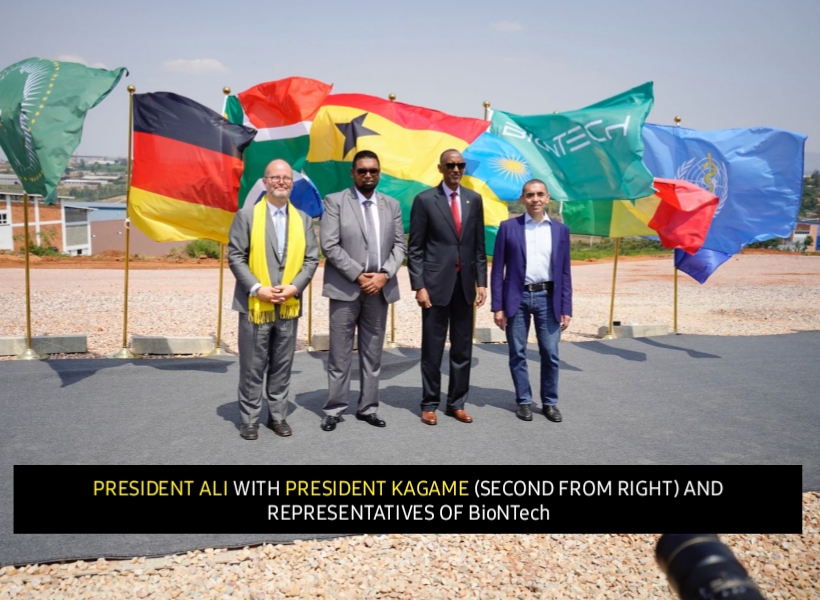President, Dr Irfaan Ali said Guyana will be seeking to develop the framework and infrastructure to not only build a similar facility like BioNTech’s mRNA vaccine factory in Rwanda but to encourage investors in medical research and development.
The Head of State made this pronouncement earlier today at the launch of COVID-19 vaccine maker BioNTech’s mRNA vaccine factory in Kigali, Rwanda’s capital city, which will enable the African nation to jump-start its own manufacturing.
“Of course, for Guyana, this is the direction we want to head in. We want to be able to develop the framework and infrastructure to be able not only to build a similar facility in Guyana but to encourage investors in research and development in the medical field as a whole to come to Guyana as a medical hub, in developing vaccines and developing a treatment for malaria, etc.”
To achieve this, the President noted, will require the “right” regulatory, legislative and institutional framework and the support of countries like Rwanda and Ghana, which have already chartered the way. To this end, bilateral discussions on the way forward are already “on the agenda” with the two African nations.
“We can work with these countries in building our regulatory framework, our institutional framework, and developing the training facility that will ensure we have highly skilled and capable human resources to transition into this new field and to transition into this new area of developmental opportunity that we want to bring to Guyana.”
President Ali recalled that the COVID-19 pandemic taught the importance of not only having access to vaccines but in ensuring that every region is vaccine secure. It also highlighted the great inequality in not only the manufacturing of vaccines and the pricing but also the distribution.
REGIONAL COLLABORATION
The President disclosed that Guyana and Barbados will be “aggressively” working together with the innovators, researchers, and developers in advancing this goal.
“Well, Prime Minister Mottley and I had had some discussions already. And one of the things that we’re looking to do is to have the regulators and the Attorney Generals for the countries look at our existing legal framework, look at our existing food and drugs administration, and to see how we can bridge the gap and then to take the model out of Rwanda and Ghana, to incorporate that model in advancing our legislative framework to build a foundation that this industry can be built on.”
IMPORTANCE OF FACILITY
Such a facility in Guyana, he emphasised, will benefit the entire Caribbean Region as well as South America and will provide access to many other vaccines utilising the technology.
“Well, it’s not only Guyana; we are an important hub. We are part of the Caribbean; we are a part of South America. We have a lot of trade agreements with a number of countries, and it is one to ensure that the region itself, Guyana and the region, has a facility that we can be dependent on in terms of crisis vaccines, to respond to our own needs, the built our capacity, and also, more importantly, to make us vaccine secure.”
The President said too, that the intention is to bring the local players in the pharmaceutical industry together in a consortium with the regional and international actors to generate the capacity needed.
He reminded that part of Guyana’s development trajectory in diversifying the economy is to invest in the knowledge sector and to invest in health care and education as a great export earner for Guyana.
BioNTech’s mRNA said that the initial vaccine factory in Kigali, made from an assembly kit and housed in shipping containers would, over the next few years become part of a wider supply network spanning several African nations, including Senegal and South Africa. (Modified from the Press and Publicity Unity, Office of the President)











